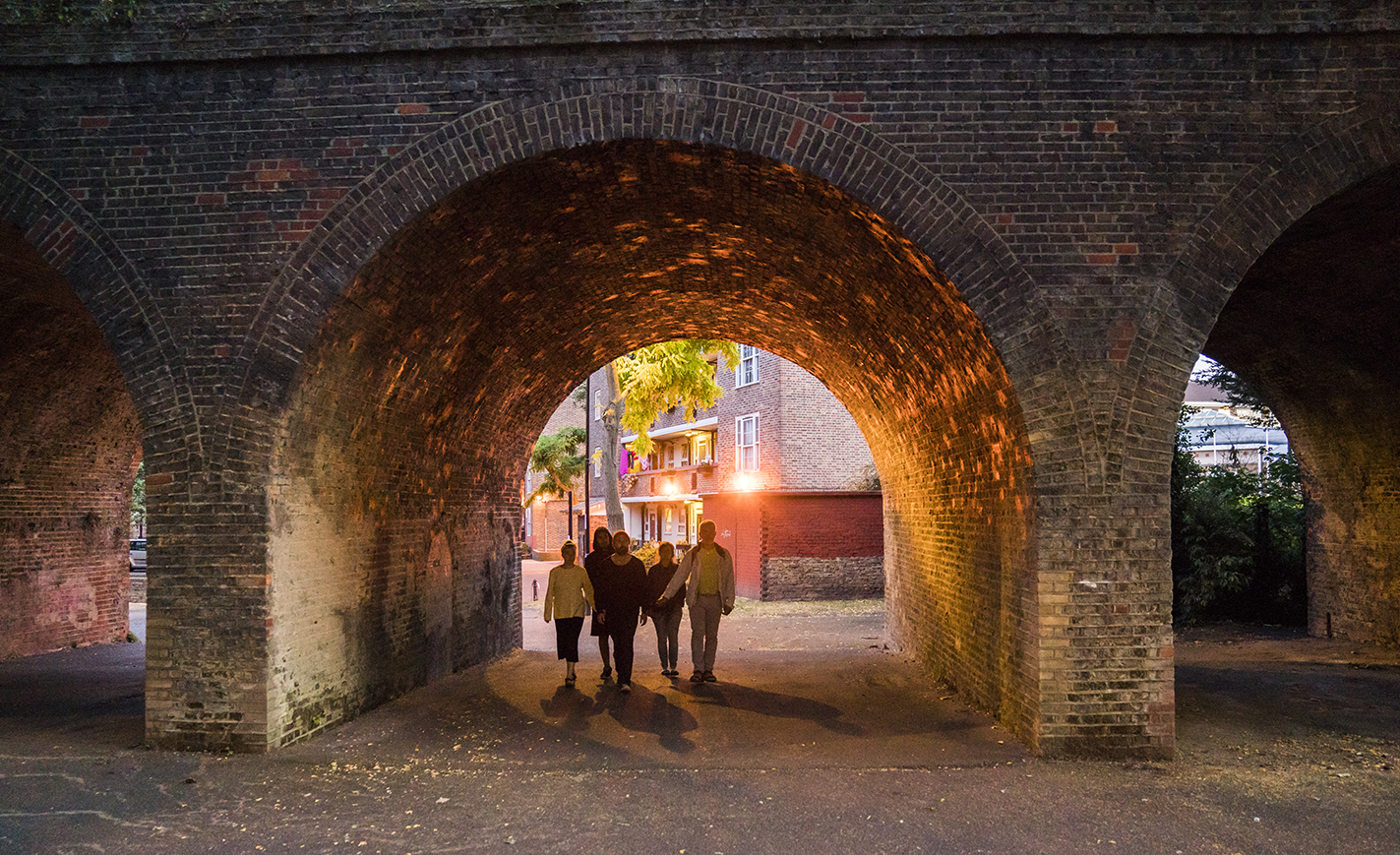Animal skulls. An old globe. A bowl of snakeskins. Binoculars. A stuffed hare whose body is stretched out in that unnatural way bodies are hung up before they are roasted, or like a cat waiting to be stroked. A vintage television set. The body of a fox on his hind legs, holding a silver tray of apples.
Those who make the pilgrimage to Deptford’s folksy junk paradise of a market, on three days a week, a stone’s throw from here, are used to seeing jumbled compositions of detritus on tables; so are, presumably, the locals hanging out in the concrete square, sitting on the benches drinking in a not-so-picturesque way. There isn’t any green in this square. It smells like piss.
This time, the arrangement signals the starting point of Nocturne, a dusk to dawn nightwalk performance promising to take us to the ‘edge of the city.’
I know Deptford as host to half the art and dance students in London, so maybe ‘edge’ is too strong a word. Nonetheless Deptford is full of small ones: it’s a place arranged in slivers and strips. The gritty market square has just sprouted a sleek station-side twin, all nice brick and dense coffees; the high street’s a sagging riot of colours and smells, interspersed with freshly-injected hipster bars. The poetics of displacement, traces of the past overlaid with the new, are hard not to walk through.
What we’re promised in Nocturne is a chance to note and experience the overlooked, the forgotten, the elusive. In the cracks and behind the shrubbery. In the dark. At night.
But first, of course, we are to read about it.
In the library, the audience is in groups of six, ushered to a cluster of chairs. A handsome, hard-bound book awaits in each seat, introductory poetic portraits of rats, gulls, foxes – the beings we are about to tune into.
The walk begins: a cluster of six human theatregoers hold onto a short loop of rope, attached to the back of our black-clad guide, who, it’s easy to imagine, has trained either as a ninja or a dog. Behind them we’re a clumsy noisy racket bumping into one another, a bit like a cartoon, but stopping and pricking our ears up on cue. We loop around Deptford, from the high street down an alley and across the street, through an overgrown parking lot, a nature refuge, fenced-in courtyards, the hedges by a housing complex, periodically cued to stop and observe: a fish in a shop window aquarium, a fox in that patch of grass. On some stops, I can’t figure out what we’re supposed to be noticing; the guide’s abilities seem preternatural, or my mind distracted. But then the more it happens, I start calling shenanigans on there being a particular object to attend to, and think rather as an invitation to just pay attention generally.
Rats or gulls never materialise, or I miss them when they do, but foxes are everywhere. When we stop to acknowledge one, the recognition is always mutual; there is a moment. I would be happy for an entire night of these moments.
But woven into the performance is us weaving, from these outdoors expeditions to the library, the repository, to decant or consolidate artefacts. The performers recount sounds and observations enumerating elements from the walk; then a concert of sounds, screeching, ululating and communicating with each other; the library becomes a kind of aural forest.
We go back out and do the loop again, with our guide, this time with the rope let out in a line. The human inhabitants of Deptford are bemused at these people, going about in odd packs; there is also a moment of mutual noticing with that.
The next time we enter the library, there are lit cylindrical tanks, one for each group, and our guide starts dropping things in: the skull of an animal, a pack of cigarettes, plastic toys, living plants. The container looks much like a test tube. We watch these settle in unexpected relationships to each other, something between a still life and a jumble one might encounter in a river or creek, were the water clear.
By the time I am outside for the third zigzag journey, there is a cart of apples in the street – the fox’s offering. A set of chairs is arranged as a theatre overlooking the scum-covered creek behind Laban, and many of us dutifully sit, waiting for some sort of show. People start making pre-show chitchat. A sprinkler comes on. The stage is set, as though what we are waiting for (and maybe we are) is for a host of animals to prance into view, as for a curtain call. But there’s a reason we’re all facing the river, on the hill, with all that open air: what comes into your sphere of attention, mostly has to do with your quality of attention. Right? I take a blanket from the chair and wrap it around myself, eating the apple perhaps meant for the fox.
Fox-hunts of the classic variety, I learn, are still being held in England, but now in mock fashion, the fox-hunt without the fox, a kind of heritage theatre, like war reenactments, where the ceremonial trappings of an imperial gentleman’s sporting activity can be practiced. A trail of artificial fox scent is laid out for the dogs to follow, in a winding, zigzag trajectory that might mimic a fox’s movements. On occasion, however, an actual fox will find themselves on the grounds, and confuse the whole thing. If the dogs pick up on their scent, then the entire operation is oriented towards hunting an actual fox, and the simulation unwittingly becomes real without any of the humans noticing. The person laying out the fox spray plays a different game than a fox would; the choreography operates on different logics. Hunters say they prefer following human trails, because they know better how to ‘play the game’.

